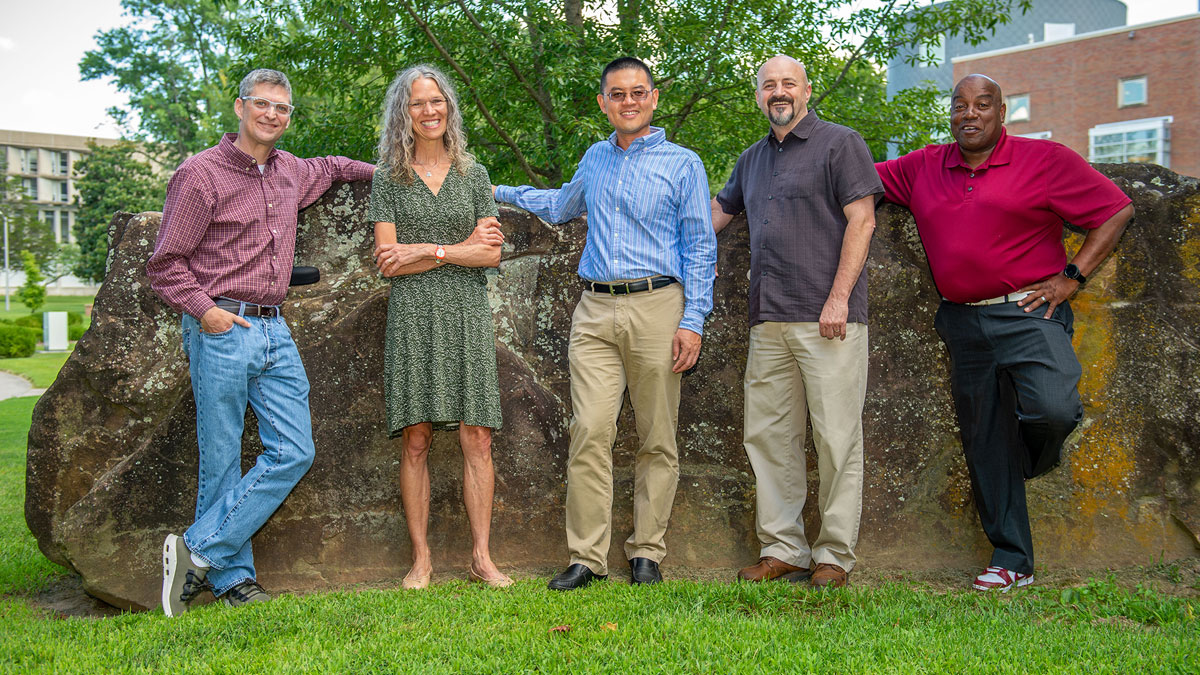
An interdisciplinary research team at Southern Illinois University Carbondale is creating a scholarship program aimed at bringing a sustainability mindset together with science and engineering training to target low-income transfer students who will become the next generation of geoscientists. The team members, left to right, include Justin Schoof, Leslie Duram, Ruopu Li, Harvey Henson, and Wendell Williams. (Photo by Russell Bailey)
August 24, 2022
SIU research team wins $1.33M NSF grant to train sustainability-focused geoscientists
CARBONDALE, Ill. — Sustainability is for everyone, and a Southern Illinois University Carbondale research team is creating a scholarship program aimed at bringing that mindset together with science and engineering training to target low-income transfer students who will become the next generation of geoscientists.
Led by Ruopu Li, associate professor in the School of Earth Systems and Sustainability, the team has secured a $1.33 million grant from the National Science Foundation for a project “Converging Earth Science and Sustainability Education and Experience to Prepare Next-Generation Geoscientists.” Li and the rest of the team will use the grant to fund Earth-Sustainability Scholarships of up to $10,000 each for at least 40 low-income transfer students pursuing bachelor’s degrees in geography and environmental resources, and geology. The students will also receive research-based support services, and may be eligible to develop their own grant-funded sustainability projects.
“It’s an exciting education research experiment that is expected to support four cohorts of sustainability-minded next-generation geoscientists,” Li said. “If successful, this project may be used as a model for earth science education in the U.S. and the rest of the world.”
The program runs for five years, from this coming January to December 2027.
Leadership for the future
Li said a sustainability-minded STEM workforce is vital for the nation as it attempts to strategically develop natural resources, promote economic growth and make informed decisions in a rapidly changing world.
“Our project will develop an educational pipeline to broaden the participation of low-income students by reducing financial pressure and improving learning opportunities and outcomes at SIU,” Li said. “We also hope it will establish an educational prototype that supports academically talented and low-income transfer students to become sustainability-focused earth science degree graduates.”
Geoscientists will need to apply their knowledge and techniques to solve pressing environmental issues by creating and evaluating various options and approaches, Li said.
“Nowadays, sustainability is often promoted as a strong organizing principle for modern education programs,” Li said. “But historically, there has been a disconnect between sustainability and earth science training in our postsecondary education. That prevents future generations from recognizing the important issues and opportunities with sustainable development and responsible use of natural resources.”
Support services for student success
Students in the program not only will receive significant financial aid, but they also will get strong, structured support services including cohort building, leadership development, multilevel mentoring networks, and research and experiential learning. Such an approach requires all students to pursue problem-based research projects under the supervision of a faculty mentor on sustainability capstone projects, for example.
The program also will allow the SIU team to create a mini-grant program for students, with up to 10 awards to cover costs for creative earth science projects in faculty mentors’ labs each year.
A psychological model geared for success
The team also includes co-principal investigators Harvey Henson, associate professor in the School of Education and the School of Earth Systems and Sustainability; Leslie Duram, professor in the School of Earth Systems and Sustainability, Justin Schoof, professor and director in the School of Earth Systems and Sustainability, and Wendell Williams, associate vice chancellor for enrollment management. The STEM Education Research Center assisted with the grant funding.
The researchers will govern the entire approach using the psychological theory of planned behavior, or TPB. Under this theory, which seeks to link beliefs to behaviors, researchers adopt the view that three core components – positive attitude, subjective norms and perceived behavioral control – largely shape an individual's intentions and actions in pursuing goals. The researchers will use services and activities associated with TPB’s core components to drive students toward graduation.
Overall, the grant will promote research and teaching excellence as it seeks to bring together social science, Earth science and sustainability as an exemplar for a next-generation science, technology, engineering and mathematics (STEM) education.
SIU poised for success
The project directly supports the university’s strategic plan, Imagine 2030, and its pillars for sustainability and research and innovation. Li said it also provides an important collaborative opportunity for faculty.
Schoof said the interdisciplinary nature of the grant will bring added strength to the project.
“It will bridge faculty from the Geography and Environmental Resources and Geology programs in the School of Earth Systems and Sustainability to work together for better Earth science education, while also increasing overall student enrollment,” he said.
